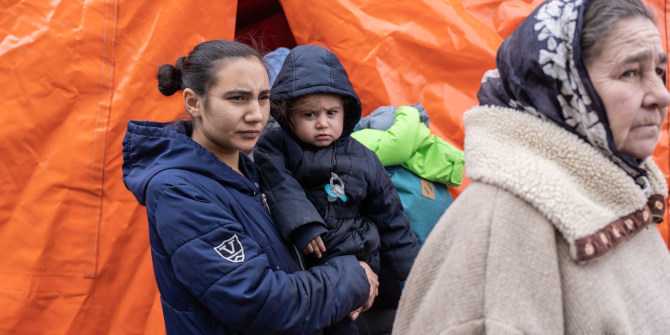Many political parties in European countries belong to transnational party alliances, which are most visible in the party groups of the European Parliament. But do these alliances influence the policy platforms adopted by parties in domestic politics? Drawing on a new study, Roman Senninger, Daniel Bischof and Lawrence Ezrow illustrate how transnational alliances help facilitate learning and policy emulation between national political parties.
Research on party competition usually focuses on domestic factors driving party behaviour, such as public opinion, rival parties, and economic conditions. More recently, scholars have started to look beyond the domestic level by examining how foreign factors – such as the world economy – impact on the behaviour of political parties.
As part of this development, scholars now examine whether and how political parties respond to foreign parties. This effort is motivated by anecdotal evidence suggesting that domestic political parties learn from and emulate foreign parties. A few examples include Tony Blair’s ‘New Labour’ drawing inspiration from Bill Clinton’s ‘New Democrat’ campaign, the Danish Conservatives taking cues from the UK Conservative Party under Margaret Thatcher, and more recently, the German party Die Linke adopting policies from the Greek party Syriza.
A seminal study by Tobias Böhmelt, Lawrence Ezrow, Roni Lehrer and Hugh Ward put this anecdotal evidence to the test, suggesting that political parties emulate and learn from successful foreign parties (i.e., incumbent parties) – a process that has been labelled ‘party policy diffusion’. The central finding that parties respond to foreign incumbent parties by adopting their policy positions is important, but the mechanism through which party policy diffusion occurs remains incomplete.
The role of transnational party alliances
In a recent study, we theorise that party policy diffusion takes place through transnational party alliances at the European Union level, which are composed of representatives from national parties and provide an arena for inter-party exchange. Transnational party alliances have a special role in facilitating contact between national party representatives. They organise congresses and conferences which bring together prime ministers and party leaders to agree political strategies and resolutions.
Most centrally, transnational party representation in Europe takes place through the party groups in the European Parliament, which have huge potential to facilitate party policy diffusion. They organise their own political activities, which form an important channel of communication between national parties, as groups frequently welcome representatives from national parties, including ministers and front-bench parliamentarians. In addition, they often send delegations to national parties, organise seminars and conferences with national parties, and publish brochures, studies, and newsletters aimed in part at national parties.
Hence, we argue that party policy diffusion (i.e., responsiveness to the policy positions of foreign incumbents) should appear between parties that belong to the same party group in the European Parliament more than between parties that do not have the possibility to exchange policy positions through institutionalised transnational party alliances.
To test our hypothesis, we use time-series cross-sectional data that include more than 200 parties from 26 Western European democracies for the time period from 1977 to 2010. To measure a party’s left-right position, we rely on the Comparative Manifesto Project data, which provide a measure of each party’s general left-right placement. We estimate spatio-temporal autoregressive models which allow us to model the connectivity between our units of analysis defined by incumbency status of the foreign party and parties’ belonging to transnational party alliances.
We find that political parties respond to the left-right position of foreign incumbents in the same transnational party group. This supports our argument that the highly institutionalised party cooperation in the European Parliament plays an important role and constitutes a mechanism through which party policy diffusion occurs.
The European Parliament is home to many different parties belonging to a range of different party groups. It might be that how party policy diffusion in the European Parliament occurs varies across party groups. Specifically, Social Democrats should be more inclined to adapt their policies to successful incumbent parties of their group as their efforts to exchange internationally is well known in the scholarly debate. To estimate heterogeneity across groups, we show long-term effects from four models in which we disaggregate the data so that only parties within each party group are connected with each other.
Figure 1: Party policy diffusion within groups in the European Parliament
Note: The group abbreviations are as follows: Party of European Socialists (PES); Union for Europe of the Nations (UEN); European People’s Party (EPP); Alliance of Liberals and Democrats for Europe (ALDE).
As Figure 1 shows, we do find a positive coefficient of party group belonging across all groups other than the Liberals, which is consistent with the central finding of our study. Party policy diffusion is strongest amongst parties belonging to the Social Democratic group.
New perspectives
The European Parliament has increased its impact on European Union decision-making over time and its decisions influence the lives of millions of European citizens. Our research shows that the European Parliament also indirectly shapes the positions of national parties because parties’ participation in the institutionalised party groups in the European Parliament facilitate learning and emulation between national political parties. Follow-up research should further examine how the institutions of the European Union shape the ideas and positions of participating actors.
In addition, our findings show that the influence of incumbent parties does not stop at national borders. When a new government forms after an election, commentators usually discuss the consequences for domestic politics. Our research shows that incumbent party policies in a member state of the European Union can have an effect on party competition in other member states through transnational party alliances. In the future, we should therefore pay more attention to parties’ decisions about membership in transnational party alliances.
For more information, see the authors’ accompanying paper at Political Science Research and Methods
Note: This article gives the views of the authors, not the position of EUROPP – European Politics and Policy or the London School of Economics. Featured image credit: European People’s Party (CC BY 2.0)





